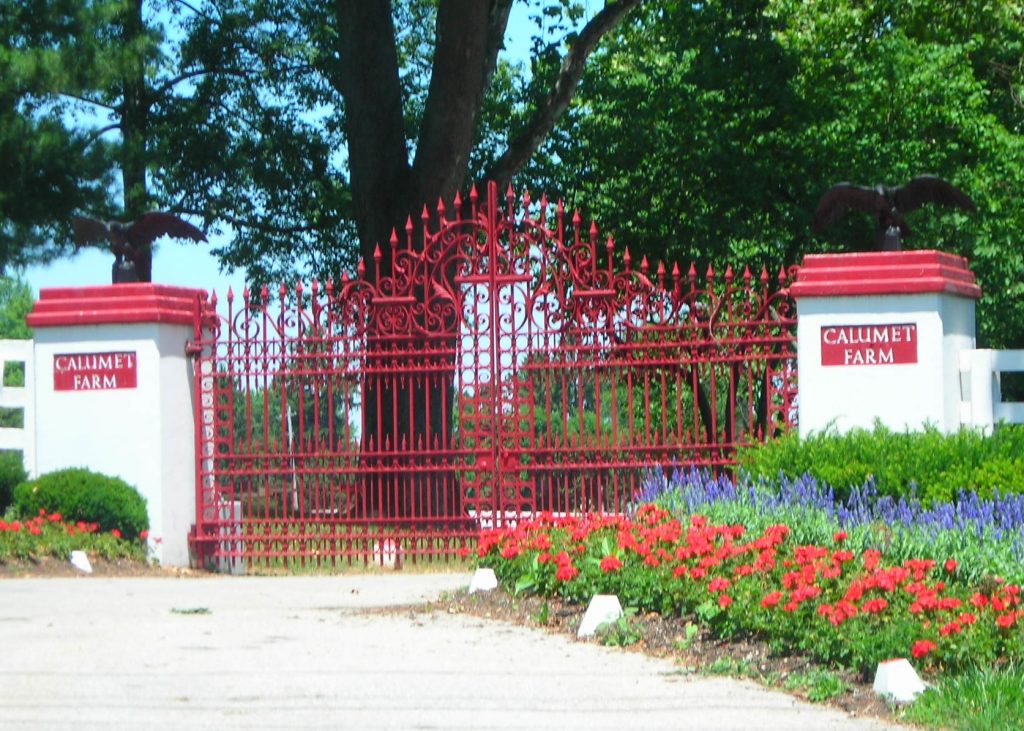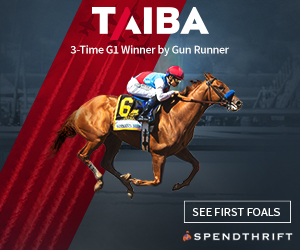
By Peter Lee
Perhaps no other farm in the United States has a history as rich and dramatic as Calumet Farm. From its list of champion Thoroughbreds and historical figures to its historical devil-red and blue silks worn by those champions’ jockeys, Calumet has conveyed a reputation of winning for almost 100 years. And it has been a roller-coaster ride for the farm.
Calumet began as a small farm in Lexington, Kentucky in 1924, established by William Monroe Wright, who had made his millions as the owner of Calumet Baking Powder Company. Wright originally created the farm to breed Standardbred horses, and actually won the Hambletonian in 1931 with his horse Calumet Butler.
When Wright died in 1932, his son, Warren Wright Sr., took over operations at the farm and changed the focus of the farm to breeding and racing Thoroughbreds. He didn’t waste time trying to build an empire. Three major decisions turned Calumet into a powerful dynasty over the next two decades.
One was hiring trainer Ben Jones in 1939 to condition his horses. Jones and his son, Jimmy, would train Calumet’s horses for the next 20 years, including an amazing seven Kentucky Derby winners and two Triple Crown winners.
The second decision was to buy a yearling named Bull Lea in 1936. The colt won only 10 of 27 races during his career, but he would flourish at stud, becoming top sire five times during the 1940s and 1950s. His notable prodigy included top Calumet horses such as Armed, Twilight Tear, Citation. Coaltown, Hill Gail, and Iron Liege.
Wright’s third good decision was purchasing part of a stallion named Blenheim II, who had won the 1930 English Derby. In 1941, that investment paid off when Blenheim II’s son Whirlaway easily won the Triple Crown for Calumet Farm. Citation, who is consistently noted as one of the top Thoroughbreds of all time, repeated that achievement in 1948.
Wright Sr. died in 1950, and his wife, Lucille, managed the farm for the next 32 years. The 1950s continued the Calumet dominance with three more horses winning the Derby, but the 1960s and 1970s saw a decline in the performance of the horses coming out of the farm. Only Forward Pass won the Kentucky Derby during those two decades — in 1968 — and that was because the horse who finished first, Dancer’s Image, was disqualified.
The farm’s only stars in the 1970s were Davona Dale, who won the Triple Tiara for fillies in 1974, and Alydar, who in In 1978 would have won the Triple Crown had it not been for the impassable colt Affirmed, who battled Alydar every step of all three races and took the crown from him.
Lucille Wright Markey died in 1982, and her will stipulated that the farm should go to her late son’s heirs. Lucille “Cindy” Wright was the oldest child, and her husband, J.T. Lundy, took over operations.
What Lundy did to Calumet Farm is documented in Ann Hagedorn Auerbach’s Wild Ride: The Rise and Tragic Fall of Calumet Farm Inc., America’s Premier Racing Dynasty. In nine years, Lundy turned a successful farm into one that declared bankruptcy. In November 1990, Alydar mysteriously died at the early age of 15 and just happened to have a $36 million insurance policy on his head, leading some to point to foul play in the incident.
In 2000, Lundy and the farm’s chief financial officer, Gary Matthews, were found guilty of bribery and fraud, having bilked the First City National Bank of Houston of $65 million in loans. He served a 4 1/2 year prison term.
The farm declared bankruptcy in 1991 but was saved from extinction in 1992 when a trust headed by Henryk de Kwiatkowski, a Polish-born Canadian, bought it. In 2012, the Kwiatkowski Trust sold it to the Calumet Investment Group, which in turn leased it to Brad M. Kelley. The dividends paid off quickly; the next year, Calumet’s Oxbow, racing under the unfamiliar black and gold silks of Kelley’s Bluegrass Hill instead of the historic devil’s red and blue silks, won the Preakness Stakes. The old silks were sold to a Brazilian investment group at a 1992 bankruptcy auction.
Oxbow now stands at Calumet along with 13 other stallions as the farm tries to return to its glory years. Despite the turmoil, the 762-acre farm is still named Calumet, and even without its colors or the Wright family, it still maintains its rich tradition. That’s something that will never go away.
Photo Credit: missing8519 / Flickr



